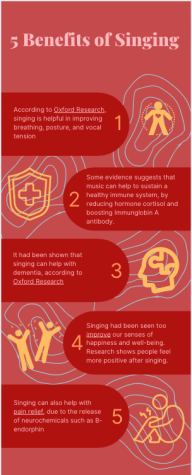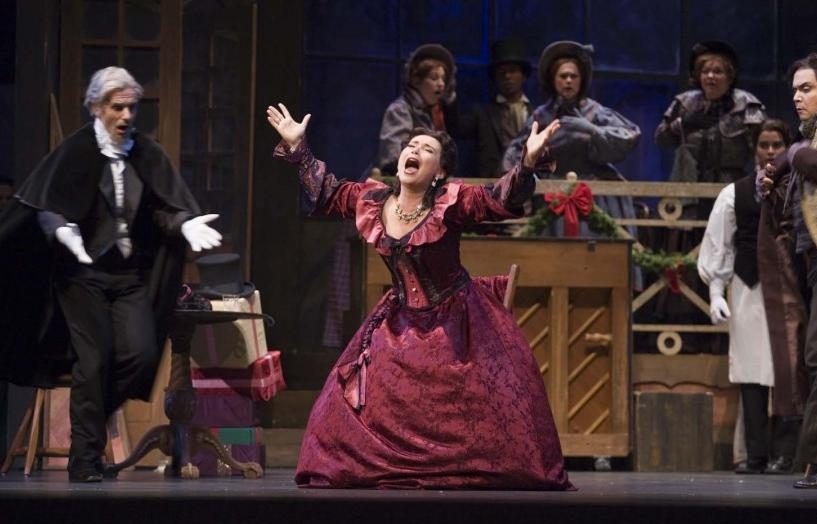As Olga Chernisheva stepped onto the stage of Bolshoi theater, nearing the end of her prime in music, she only had one thing on her mind: enjoying the moment. Her 10-minute-long performance proved to be an essential step in pursuing her passion and making the most of her life on stage.
Since an early age, Chernisheva has been learning about music, becoming familiar with the hardships concerning family life and vocal issues. However, she also had to consider the financial aspects of her career.
According to a study by the Music Industry Research Association (MIRA), an average musician gets paid a yearly sum of only $21,500. The National Education Association (NEA) found that a teacher’s income averages just over $41,770. These statistics hint at the underpayment and struggle that comes with a career in music and teaching.
Chernisheva, a musician and vocal coach, is both.
When Chernisheva first listened to the Solace of the Kremlin Choir in Russia, her excitement drove her to get a role in the group and start her musical career.
“I would come behind the door and listen, it was like, oh my god,” Chernisheva said.
Despite her love for the choir, the first step in her career was almost the last.
“I almost ruined my voice by singing and I lost my voice,” Chernisheva said. “It was the worst time in my life.”
She was left devastated after receiving the news that she wouldn’t be able to sing for two months, a time that may be short for some, but priceless for a musician. Her doctor noted the strain her voice endured after singing parts that were above her range during her time in the choir. As a result, had to let go of her role in the group after vocal injuries, opting to focus on a new path in her career.
However, she still began to acquire greater roles in the music industry, working at the Bolshoi Theatre
 and later in the young artist’s program in San Francisco, where sshe continued to strain her voice.
and later in the young artist’s program in San Francisco, where sshe continued to strain her voice.
“I learned the hard way that you should not sing the parts you’re not supposed to be singing, and you need to make smart choices. Because the voice is an instrument,” Chernisheva said.
After working for the next couple of years at the theater she became pregnant.
Chernisheva realized the complications that came with being pregnant in the industry, with pregnant women having a far lower chance to acquire major roles, due to changes in their voice. According to the Osborne Head and Neck Institute, the rise in estrogen and progesterone changes can have many effects on a woman’s voice.
Despite these issues, she continued to work and auditioned for the Bolshoi theater.
Chernisheva impressed the judges after her remarkable performance on stage regardless of her worries.
“I was just enjoying what I was doing. It was me showing my voice,” Chernisheva said.
For the next couple of years, Chernisheva moved between Russia and other parts of the world, living a busy life touring with companies, and participating in productions. After giving birth to her second daughter, she had to make a decision, choosing between her family and her career.
“I choose my family. So I went to the United States and I had to start my career. But I was already a very old woman who had to compete with young girls while I was 35,” Chernisheva said.
Working in music, she also noted how ageism plays a significant role in the view people have of you and your legitimacy as a singer. According to Berklee College of Music, ageism causes younger generations to see themselves differently from their elders, thus, making it harder for older generations to maintain a successful role in music.
“When you’re 50 years old, you’re not really credible,” Chernisheva said.
As she began to move past her prime in music, Chernisheva understood the choices she would have to make about her career. From having a second baby to balancing her family life with her work life, it was impossible to continue her occupation in the same manner due to the demanding lifestyle of a musician.
“I was already doing a very difficult role in production, but I changed what drove my interest. Because my interest was focusing on my baby,” Chernisheva said.
After her career in musical theater and moving to the United States, she began to teach music lessons. Having encountered inexperienced teachers, whose training led to vocal damage, at first, Chernisheva was nervous to teach.
“I know so many people, so many young figures, who in my opinion were destroyed because of an inexperienced teacher. Singing is more like a sport, it’s your body you’re working, and there are risks,” Chernisheva said.
Teaching, however, turned out to be a great path for her.

Avantika Swaminathan is a student who’s been learning from Chernisheva for almost 10 years. She has participated in countless competitions as well as the Certificate of Merit and mentions the passion she can see in Chernisheva teaching
“She is very direct, nurturing, and cares very deeply about her students, their well-being, and their success vocally and musically,” Swaminathan said.
She also notes how Chernisehva has helped her to overcome mental barriers, such as her confidence while singing.
“There have definitely been portions, especially during the pandemic where I wasn’t as confident in my voice and my singing, and even earlier than that, when I first started performing I had a lot of stage fright and wasn’t always learning my songs as quickly as she knew I was capable of doing. So she would encourage me and she would, you know, kind of set me straight to work on those things and not get bogged down by whatever was influencing me to not feel as confident,” Swaminathan said.
Like Chernisheva, Genevieve Tep is also a music teacher, teaching Carlmont’s Choir teacher with her degree in vocal performance. She also enjoys the job due to the many benefits that singing can bring.
“Singing together actually lowers stress and stimulates the vestibular nerve. It’s tactile and physically improves people’s health,” Tep said.
Besides the physical benefits though, people are music teachers for the gratification that comes with the job. After teaching for nine years, Chernisheva appreciates the improvement she can see in her students.
“I enjoy seeing that the student is developing, growing, and becoming an artist because what is singing? It’s art, not just, you know, singing notes. Art is when you invest your time, personal energy, and knowledge. You always experiment when you invent something, try different things, and see how things actually start working, so that is amazing,” Chernisheva said.
Not only mentally but vocally, Chernisheva has helped Swaminathan through technical issues regarding her voice.
“I like how she is very direct and gets right to the point about what needs to be improved upon, but also balances that by telling you the things that are going positively or that you’ve improved significantly on,” Swaminathan said.
Swaminathan’s challenges concerning balancing a lighter and darker voice, piano and scudo, were also overcome with the help of Chernisheva.
“When I was younger, my voice was a lot darker, and I wasn’t well-versed in the techniques to make my voice have a good balance of piano and a scudo of light and dark, and because of that, when I was competing and stuff, people would assume that I was trying to make my voice sound older, which was not the case, I just wasn’t technically very advanced. Now I’ve started to be able to sing higher notes and my voice is a bit more balanced in terms of lightness and darkness and does have a brighter, fuller sound.” Swaminathan said.
Despite the hardships that come with being a musician, Chernisheva continues to teach music, being interested in singing and watching her students grow.
“My favorite part of teaching is to see my students developing,” Chernisheva said.




